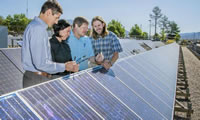Battling corrosion to keep solar panels humming
 Sue Holmes for Phys.org: People think of corrosion as rust on cars or oxidation that blackens silver, but it also harms critical electronics and connections in solar panels, lowering the amount of electricity produced.
Sue Holmes for Phys.org: People think of corrosion as rust on cars or oxidation that blackens silver, but it also harms critical electronics and connections in solar panels, lowering the amount of electricity produced.
"It's challenging to predict and even more challenging to design ways to reduce it because it's highly dependent on material and environmental conditions," said Eric Schindelholz, a Sandia National Laboratories materials reliability researcher who studies corrosion and how it affects photovoltaic (PV) system performance.
Sandia researchers from different departments collaborate to accelerate corrosion under controlled conditions and use what they learn to help industry develop longer-lasting PV panels and increase reliability. For example, work by Olga Lavrova of Sandia's Photovoltaic and Distributed Systems Integration department demonstrated, for the first time, a link between corrosion and the risk of arc faults in PV systems' electrical connections. Research by Erik Spoerke of Sandia's Electronic, Optical and Nano Materials department focuses on developing new nanocomposite films that could dramatically increase reliability. Cont'd...
Comments (0)
This post does not have any comments. Be the first to leave a comment below.
Featured Product

